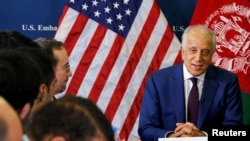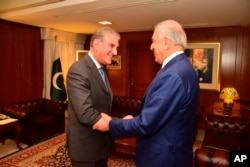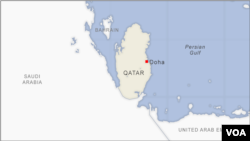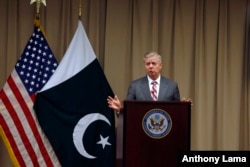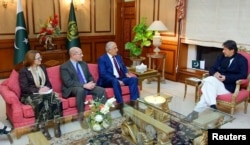Afghanistan's Taliban opened a new round of peace talks Monday in Qatar with the United States, the insurgent group said.
A Taliban spokesman, Zabihullah Mujahid, said the two-day meeting in Doha will continue on Tuesday.
Zalmay Khalilzad, U.S. special representative for Afghanistan political reconciliation, is leading the U.S. delegation.
"Following American acceptance of the agenda of ending the invasion of Afghanistan and preventing Afghanistan from being used against other countries in the future, talks with American representatives took place today in Doha, the capital of Qatar," Mujahid said. The session will continue Tuesday.
Khalilzad has held several rounds of talks with Taliban representatives in Qatar in recent months, and the last interaction between the two sides had taken place in the United Arab Emirates in December.
Diplomatic sources privy to the previous meetings told VOA that Taliban and U.S. delegations in their current dialogue are expected to finalize proposals they had exchanged in Abu Dhabi regarding a timeline for the withdrawal of foreign troops from Afghanistan. An immediate anticipated outcome could be a temporary cease-fire announced by the Taliban to build mutual confidence to keep the dialogue process moving forward.
Monday's meeting was originally set to take place in Pakistan where Khalilzad stayed for several days before traveling to Qatar. Sources said Taliban officials refused to come to Islamabad unless the U.S. side agreed to discuss a withdrawal plan for U.S.-led foreign troops from Afghanistan.
The uncertainty following the Taliban's backing away from the proposed meeting in Pakistan led to speculation about a breakdown in the peace dialogue.
U.S. Sen. Lindsey Graham, who undertook a daylong visit to Islamabad on Sunday, dismissed suggestions the dialogue with the Taliban was faltering, and praised Pakistan's effort to help the Afghan peace process.
The South Carolina Republican senator, who is considered close to President Donald Trump, spoke after a meeting with Prime Minister Imran Khan.
"I can tell you, the fact that the effort that was made is good. It is going to take a while. I talked with Prime Minister Khan, and I think he is going to deliver a message that would be very helpful," Graham said. He did not elaborate.
Monday's U.S.-Taliban talks came as Khan also arrived in Doha for official meetings with the Qatari leadership. Diplomatic sources told VOA that Khan is likely to make contact with Taliban officials during the visit to encourage them to help in negotiating a political resolution to the Afghan war.
After ending his visit to Pakistan on Sunday, Khalilzad sounded upbeat about the future of Afghan peace talks, saying he had "good meetings" in Islamabad.
"I appreciate their (Pakistan's) hospitality and resolve to push for Afghan peace. We're heading in the right direction with more steps by Pakistan coming that will lead to concrete results," the Afghan-born chief U.S. negotiator said.
Graham, in his press conference Sunday, noted Pakistan was taking significant steps under Khan's leadership to promote Afghan peace and regional security. He praised Pakistan's effort to fence the 2,600-kilometer largely porous border the country shares with Afghanistan to deter cross-border terrorism.
"I am going to go back and talk to President Trump about my meeting with Prime Minister Khan, and I am going to urge him to meet with the prime minister as soon as practical," said Graham. "Prime Minister Khan was criticized over the past 10 or 20 years about talking about reconciliation with the Taliban. He was right."
Before coming to power last July, Khan had consistently called for the U.S. to engage the Taliban in peace talks rather than using military power to end the Afghan war. His critics would call him "Taliban Khan" for demanding and supporting reconciliation with the Islamist Afghan Taliban.




